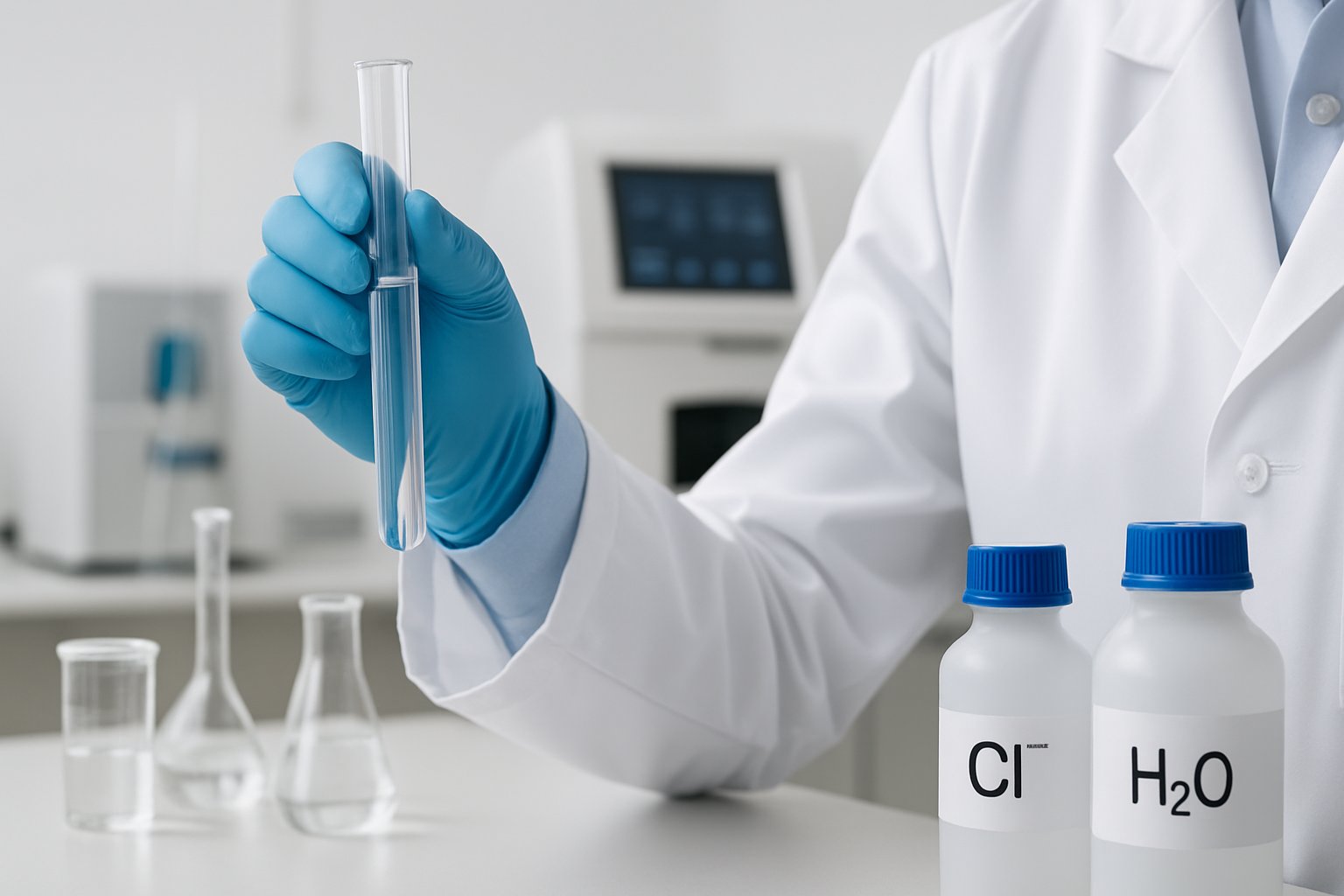Dehydration is the leading cause of elevated chloride levels in the blood. Kidney problems and certain medications can also raise chloride concentrations. Common symptoms include increased thirst, frequent urination, and muscle weakness.
High chloride levels in your blood can signal several health issues, but understanding the root cause helps you take the right steps toward better health. Chloride is an important mineral that helps your body maintain proper fluid balance and supports healthy digestion.

Dehydration is the most common cause of high chloride levels[1], though kidney disease, certain medications, and excessive salt intake can also raise these levels. When the body loses too much water through sweating, diarrhea, or not drinking enough fluids, chloride becomes more concentrated in the blood.
High chloride levels can cause symptoms like excessive thirst, frequent urination, and muscle weakness[2] as the body tries to restore balance. Learning about what drives these changes can help people recognize warning signs and work with their doctors to address the underlying problem.
Understanding High Chloride Levels

Chloride serves as a vital electrolyte that maintains proper fluid balance and supports essential bodily functions. Normal chloride concentration ranges from 96-106 mEq/L in blood, with elevated levels indicating potential health concerns.
Role of Chloride in the Body
Chloride functions as one of the body’s most important electrolytes alongside sodium, potassium, magnesium, and calcium. It works closely with sodium to maintain proper electrolyte balance throughout the body’s tissues and cells.
The kidneys regulate chloride concentration by filtering and reabsorbing it as needed. This process helps maintain acid-base balance and prevents dangerous fluctuations in electrolyte levels.
Chloride performs several critical functions:
- Maintains proper fluid balance between cells and blood
- Supports nerve signal transmission
- Helps muscles contract normally
- Regulates blood pressure
Chloride combines with hydrogen to form hydrochloric acid in the stomach. This stomach acid breaks down food and kills harmful bacteria during digestion.
Normal Versus Elevated Chloride Levels
A comprehensive metabolic panel (CMP) measures chloride levels in blood to assess electrolyte balance. Normal chloride concentration typically ranges between 96-106 milliequivalents per liter (mEq/L).
Healthcare providers consider chloride levels above 106 mEq/L as elevated. Mild increases may not cause immediate symptoms, while significant elevations can lead to serious health problems.
Chloride level ranges:
- Normal: 96-106 mEq/L
- Mildly elevated: 107-110 mEq/L
- Significantly elevated: Above 110 mEq/L
Regular monitoring helps detect hyperchloremia and its underlying causes[1] before complications develop. Blood tests can reveal patterns that indicate specific medical conditions affecting electrolyte levels.
Key Functions: Electrolyte and Fluid Balance
Chloride works with sodium to regulate fluid balance between blood vessels and surrounding tissues. This partnership prevents dangerous fluid shifts that could affect organ function.
The chloride-sodium relationship maintains proper blood volume and blood pressure. When chloride levels rise, sodium often increases too, leading to fluid retention and elevated blood pressure.
Chloride helps maintain acid-base balance by buffering excess acids in the blood. This prevents the blood from becoming too acidic, which could damage organs and disrupt normal body functions.
Primary electrolyte interactions:
- Sodium + Chloride: Controls fluid distribution
- Potassium balance: Affects heart rhythm
- Bicarbonate relationship: Regulates blood pH
Table salt (sodium chloride) provides both sodium and chloride when consumed. Excessive salt intake can disrupt electrolyte balance and raise both sodium and chloride levels in blood.
Primary Causes and Effects of Elevated Chloride

Dehydration stands as the most frequent cause of high chloride levels[2], while kidney disease, certain medications, and various medical conditions also contribute significantly to hyperchloremia. These factors often work together to disrupt the body’s normal electrolyte balance.
Dehydration as the Leading Cause
Dehydration represents the primary driver of elevated chloride levels in most patients. When the body loses excessive fluids, chloride becomes concentrated in the remaining blood volume.
Common dehydration triggers include:
- Prolonged vomiting episodes
- Severe diarrhea lasting multiple days
- Excessive sweating during intense physical activity
- Inadequate fluid intake over extended periods
The concentration effect occurs because water leaves the bloodstream faster than chloride. This creates an artificial elevation in chloride measurements even when total body chloride remains normal.
Rehydration typically resolves dehydration-related hyperchloremia within 24-48 hours. Patients should consume water gradually rather than large amounts at once to prevent further electrolyte imbalance.
Role of Kidney Disease and Impaired Kidney Function
Kidney disease significantly affects chloride processing and elimination[3]. Healthy kidneys filter and regulate chloride levels by adjusting excretion rates based on body needs.
Damaged kidneys lose their ability to properly eliminate excess chloride. This leads to gradual accumulation in the bloodstream over weeks or months.
Key kidney-related conditions include:
- Chronic kidney disease with reduced filtration
- Acute kidney injury from infections or toxins
- Diabetic nephropathy causing progressive damage
- Polycystic kidney disease affecting normal function
Diabetes insipidus creates additional complications by increasing urine production while retaining chloride. Patients with this condition often develop concentrated chloride levels despite frequent urination.
Medical monitoring becomes essential for patients with kidney disease. Blood tests every 3-6 months help track chloride trends and guide treatment adjustments.
Influence of Medications and Medical Treatments
Several medications directly raise chloride levels through different mechanisms. Diuretics paradoxically increase chloride concentration despite promoting fluid loss.
High-risk medications include:
- Corticosteroids – alter kidney chloride handling
- NSAIDs – reduce kidney filtration capacity
- Estrogens – change electrolyte processing
- Ammonium chloride – provides direct chloride load
Intravenous fluids containing saline deliver concentrated chloride directly into the bloodstream. Hospitals often use normal saline for rehydration, which contains high chloride amounts.
Medication adjustments require medical guidance to prevent dangerous electrolyte swings. Patients should never stop prescribed medications without consulting their healthcare provider.
Some treatments create temporary chloride elevation that resolves after completion. Others require ongoing monitoring and dosage modifications to maintain safe levels.
Associated Conditions and Contributing Factors
Multiple medical conditions contribute to elevated chloride through various pathways[4]. Metabolic acidosis forces the body to retain chloride while losing bicarbonate.
Primary contributing conditions:
- Congestive heart failure causing fluid retention
- High blood pressure affecting kidney function
- Addison’s disease disrupting hormone balance
- Cushing’s syndrome increasing cortisol levels
Dietary factors play a supporting role in chloride elevation. Processed foods contain concentrated sodium chloride that accumulates over time.
Salt intake from restaurant meals and packaged foods often exceeds daily requirements. The average person consumes 3-4 times the recommended chloride amount through processed foods alone.
Dietary recommendations include:
- Limiting processed meats and canned foods
- Choosing fresh fruits and vegetables
- Reading nutrition labels for sodium content
- Cooking meals at home when possible
Adrenal insufficiency creates complex electrolyte imbalances affecting multiple systems. These patients require specialized medical management to prevent dangerous complications.
Frequently Asked Questions

High chloride levels result from multiple factors including fluid loss, dietary choices, organ dysfunction, and medication effects. These elevated concentrations can stem from both temporary conditions and chronic health issues.
How does dehydration impact chloride levels in the body?
Dehydration concentrates chloride in the bloodstream as the body loses water faster than electrolytes. When fluid volume decreases, the remaining chloride becomes more concentrated in a smaller amount of blood.
Diarrhea can lead to hyperchloremia[1] because it causes significant fluid loss. The kidneys attempt to conserve water by retaining electrolytes including chloride.
Vomiting also contributes to dehydration and chloride imbalance. The body struggles to maintain proper electrolyte ratios when water levels drop rapidly.
What dietary factors can lead to increased chloride levels?
Excessive salt intake directly raises blood chloride levels since table salt contains both sodium and chloride. People who consume high amounts of processed foods often exceed recommended sodium chloride limits.
Individuals with adrenal insufficiency may crave salty foods[1], leading to elevated chloride consumption. This craving can result in consistently high chloride intake over time.
Restaurant meals and packaged snacks typically contain significant amounts of added salt. Regular consumption of these foods can gradually increase chloride levels in the blood.
Can kidney disorders cause elevated chloride concentrations in the blood?
Kidney disease affects the body’s ability to regulate chloride levels properly. Healthy kidneys filter excess chloride from the blood and excrete it through urine.
When kidney function declines, chloride can accumulate in the bloodstream. The damaged organs cannot effectively remove excess electrolytes from circulation.
Chronic kidney conditions often require dietary modifications to manage electrolyte levels. Patients may need to limit foods high in chloride to prevent dangerous accumulation.
What role does hormonal imbalance play in altering chloride levels?
Hormonal disorders can disrupt normal chloride regulation in the body. The adrenal glands produce hormones that help control electrolyte balance.
Addison’s disease affects adrenal hormone production and can lead to electrolyte imbalances. People with this condition may experience altered chloride levels due to hormonal deficiencies.
Diabetes insipidus impacts water regulation and can indirectly affect chloride concentrations. This condition causes excessive urination and fluid imbalance throughout the body.
How do medications affect blood chloride measurements?
Certain medications including carbonic anhydrase inhibitors can cause hyperchloremia[1]. These drugs alter how the kidneys process electrolytes.
Diuretics can affect chloride levels by changing fluid and electrolyte excretion. Some types may cause chloride retention while others promote its elimination.
Medical procedures like saline infusions can increase chloride levels[1]. Intravenous fluids containing sodium chloride directly add chloride to the bloodstream.
Are there specific medical conditions that contribute to high chloride levels?
Hyperchloremic metabolic acidosis represents a serious condition affecting chloride regulation. This disorder reduces the body’s ability to reabsorb chloride properly.
Respiratory disorders can indirectly impact chloride levels through acid-base imbalances. The body compensates for breathing problems by adjusting electrolyte concentrations.
Endocrine system disorders often affect multiple electrolytes including chloride. These conditions disrupt the complex hormonal signals that regulate mineral balance.
References
- Hyperchloremia: Causes, Symptoms, and Treatments. https://resources.healthgrades.com/right-care/symptoms-and-conditions/hyperchloremia Accessed October 25, 2025
- How To Lower High Chloride Levels. https://www.personalabs.com/blog/how-to-lower-high-chloride-levels/ Accessed October 25, 2025
- Chloride Levels: What High Results Mean. https://www.rupahealth.com/post/chloride-levels-what-high-results-mean Accessed October 25, 2025
- How to Lower Chloride in Blood. https://statcarewalkin.com/info/lower-chloride-in-blood-causes-symptoms-treatment.html Accessed October 25, 2025
